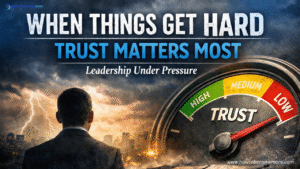
As a CEO or executive, you’re constantly faced with decisions—big ones, small ones, and everything in between. Whether it’s about company strategy, managing your team, or even deciding what’s on your agenda tomorrow, the sheer number of decisions you make every day can become overwhelming. This phenomenon is called decision fatigue, and it can be incredibly detrimental to both your mental clarity and your leadership effectiveness.
Decision fatigue isn’t a buzzword; it’s a real issue that affects countless leaders in high-pressure roles. So, how can you overcome this constant mental drain and start thinking more clearly? How can you stop feeling paralyzed by choices and start leading with the confidence and clarity your business needs?
In this blog, we’ll explore the difference between decision fatigue and indecisiveness, how decision-making can affect your business, and—most importantly—what you can do to protect your mental energy and regain your focus as a leader.
What Is Decision Fatigue?
Decision fatigue is the gradual deterioration of your ability to make decisions after a long session of decision-making. It’s not the same as indecisiveness, which is the inability to make a decision at all. Instead, decision fatigue is what happens when you’ve already made so many choices that your brain becomes too tired to continue processing them.
Imagine starting your day with a fresh mind, eager to tackle challenges. The first few decisions come easily—you’re able to weigh options carefully and choose the best path forward. But as the day goes on, every decision starts feeling harder. You might start opting for the easiest option, or worse, avoid making a decision altogether.
By the end of the day, your brain is simply exhausted. This is decision fatigue.

Decision Fatigue vs. Indecisiveness: What’s the Difference?
While both decision fatigue and indecisiveness can leave you feeling stuck, they stem from different issues. Indecisiveness is typically rooted in fear, self-doubt, or uncertainty about the right course of action. You may hesitate to commit to a choice because you’re worried about the consequences or feel overwhelmed by too many possibilities.
Decision fatigue, on the other hand, happens when you’ve been making decisions all day and your brain is too tired to keep going. You’re not necessarily unsure about what to do—you’re just too mentally drained to process the next step. This can lead to poor decision-making or an inability to prioritize effectively.
In leadership, both of these issues can cause significant challenges, but decision fatigue is especially common in high-pressure roles like those of CEOs and executives.
How Decision-Making Affects Business
The quality of your decisions directly impacts the success of your business. When decision fatigue sets in, the choices you make are more likely to be hasty or ill-considered. You might choose the path of least resistance simply because it’s easier in the moment, even though it may not be the best long-term solution.
Additionally, decision fatigue can lead to procrastination. You might avoid making critical decisions altogether because your brain can’t handle the effort. This can delay key projects, stall growth, and even create bottlenecks within your organization.
For example, instead of delegating an important task to your team, you may decide to push it off to another day simply because you’re too tired to think through the delegation process. Or, you might approve a subpar solution to a problem just to move on to the next thing on your plate.
Over time, these seemingly small decisions compound, and the effects can be felt throughout your business—resulting in inefficiencies, lack of progress, and decreased morale within your team.
The Solution: How to Overcome Decision Fatigue
So, what can you do to combat decision fatigue and reclaim your mental energy? Here are two strategies that can help you avoid burnout and make better decisions:
1. Simplify Low-Stakes Decisions
One of the most effective ways to combat decision fatigue is to eliminate unnecessary decisions from your day. Not every decision needs to be made by you, especially the ones that are low-stakes or routine. Instead, delegate these tasks to your team, allowing you to focus on the high-priority decisions that truly require your attention.
For example, decisions about scheduling meetings, approving minor expenditures, or handling day-to-day logistics don’t need to fall on your shoulders. Trust your team to handle these aspects, freeing up your mental energy for the bigger, strategic decisions that can shape the future of your business.
Delegating isn’t about losing control; it’s about focusing your energy where it matters most. When you simplify your decision-making process, you preserve your brainpower for the critical choices that will have the greatest impact on your organization.
2. Set Boundaries for Decision-Making
Another key strategy to overcome decision fatigue is to set clear boundaries around when and how you make decisions. Not every decision needs to be made immediately, and not every day needs to be filled with decision after decision.
Start by setting aside specific times of the day for making important decisions, when your mind is fresh. For many leaders, the morning hours are the best time for clear thinking. Reserve this time for strategic decisions, planning, and problem-solving, while leaving more routine decisions for later in the day when your mental energy is lower.
By structuring your decision-making process, you create a more efficient system that protects your brain from the exhaustion that comes from constant, unstructured decision-making.

One of the reasons leaders experience decision fatigue is the reluctance to delegate tasks. But why do some managers struggle with delegating authority?
Often, it comes down to trust and control. You might feel that no one else can make the decision as well as you, or you fear that delegating could lead to mistakes. However, this belief can keep you stuck in a cycle of making every decision yourself, leading to burnout.
Effective delegation is about empowering your team to take ownership of their responsibilities. When you delegate, you’re not just offloading tasks—you’re giving your team the opportunity to grow and develop their decision-making abilities. This not only frees you from decision fatigue but also creates a more resilient, capable organization.
If you find yourself reluctant to delegate, ask yourself: What’s holding me back? Is it a lack of trust in my team? Fear of losing control? Or perhaps you’re unsure how to delegate effectively. These are all valid concerns, but addressing them head-on is the first step toward creating a healthier, more efficient leadership style.
Taking Action: Connecting for Personalized Support
Decision fatigue is something all leaders experience at some point, but you don’t have to face it alone. The strategies I’ve shared today are just the beginning. There are many more techniques and approaches we can explore to help you regain mental clarity, delegate more effectively, and lead with confidence.
If you’re feeling the weight of decision fatigue, I encourage you to reach out for a confidential conversation. Together, we can identify the specific challenges you’re facing and develop personalized solutions that will help you stay sharp, focused, and energized in your role as a leader.
You don’t have to carry the weight of every decision by yourself. Let’s connect and start a conversation that will bring back the clarity and focus you deserve.
Conclusion
Decision fatigue doesn’t have to be a roadblock to your success. By simplifying your decision-making process, setting boundaries, and learning to delegate effectively, you can reclaim your mental energy and lead with greater clarity.
But sometimes, it’s hard to see the path forward when you’re overwhelmed by choices. That’s where I come in. Together, we can work through the challenges you’re facing and find solutions that empower you to be the leader your business needs.
Let’s talk. Reach out to me today for a confidential conversation that could be the turning point in your leadership journey.
Ready to start your confidential conversation? Reach out to me today, and let’s uncover the leader you’re destined to be.





